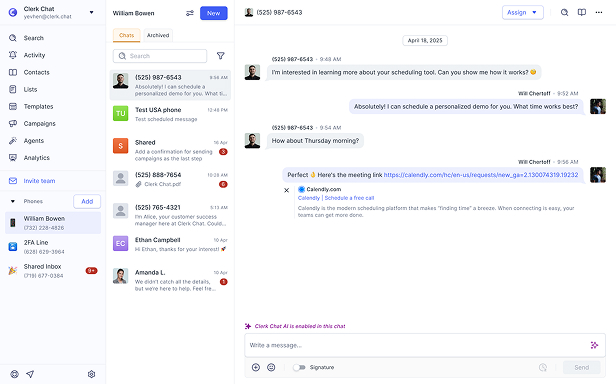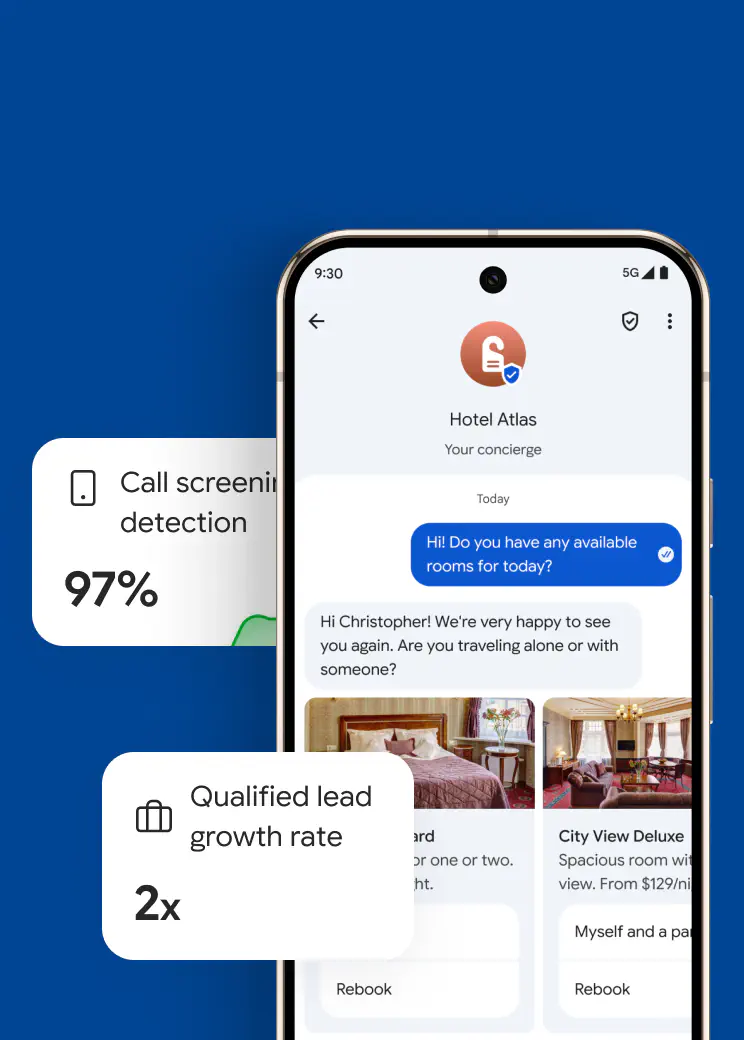How to Use Conversational AI in Retail to Engage and Nurture
By William Bowen
- Published: January 24, 2025
The retail landscape is notoriously complex and competitive. Companies need to find ways to keep costs low and boost efficiency, while adapting to ever-evolving customer expectations. Embracing the benefits of conversational AI in retail could be the ideal solution.
Conversational AI isn’t just a passing fad anymore, it’s a revolutionary technology that’s transforming customer service, helping companies increase sales, and saving employees’ time. Most importantly, this technology is helping retailers build stronger connections with customers.
According to IBM, businesses that invest in conversational AI solutions see an average 12% increase in customer satisfaction rates. So, what can you really do with conversational AI for the retail space? What are the benefits to getting involved, and how do you get started?
Read on to find out.
In this article:
What is Conversational AI in Retail?
Conversational AI is a form of artificial intelligence technology that allows machines to understand, evaluate, and take part in human conversations. It leverages solutions like natural language processing and machine learning, to allow people to interact with computer systems in an organic way.
While there are various types of conversational AI tools out there, this technology usually appears in the form of cutting-edge chatbots, voice bots, and virtual assistants.
Notably though (as you can see in our conversational AI vs chatbot guide), while traditional rule-based bots could only respond to queries with pre-selected messages, conversational AI tools can actually understand a customer’s words, their intent, and their needs.
In the retail sector, AI-powered chatbots can answer customer questions about products, provide shopping tips and guidance, up-sell and cross-sell customers, and so much more. They play a significant role in improving customer experiences, making teams more efficient, and essentially helping businesses to enable sustainable growth.
Your customers deserve the best - and so do you. Learn how to implement conversational AI into your retail business messaging strategy.
6 Powerful Use Cases of Conversational AI for Retail
As mentioned above, there are numerous ways to use conversational AI in retail, and the applications of this technology are constantly evolving (more on that later). Right now, some of the most significant use cases for conversational AI technology include:
Delivering Customer Support
Retail consumers expect rapid, effective, and convenient support from companies at all times. By embedding AI in customer service processes, retail companies can significantly improve the support experience. AI-powered bots and virtual assistants can answer customer queries 24/7, provide instant access to troubleshooting support and technical guidance, and more.
They can answer questions about return policies, products, and offers. An AI solution integrated with your order management technology can even immediately tell your customers where their products are in transit, if you’re shipping items to their door.
With conversational AI for customer support, companies can deliver more consistent assistance to their customers, while reducing some of the repetitive work employees need to handle each day. That means they have more time to focus on other, valuable tasks.
Engaging and Nurturing Customers
Conversational AI in retail gives companies a unique opportunity to constantly connect with their customers and keep them engaged. For instance, if a customer signs up to your SMS campaign or downloads a mobile app, a bot can send them messages automatically when it detects they’re close to a retail location, showing them the latest offers they can take advantage of.
Platforms like Clerk Chat even enable companies to send AI text messages to customers based on previous conversations. Follow-ups are easy for sales teams to forget - not to mention, they’re time consuming. Clerk Chat’s follow-ups can work on a schedule that you determine, never forgetting or missing a message.
This gives retailers an effective way to keep customers up to date about the latest deals, products, and offers they can provide, increasing engagement and customer loyalty.
Analyzing Customer Feedback
Feedback is a powerful resource for retailers – and not just because it’s great for enhancing your marketing strategies with social proof. Collecting feedback from your customers and analyzing their insights gives you an insight into the products and services you can improve to boost loyalty.
With conversational AI, retailers can use business messaging apps and bots to automatically request feedback and reviews from their customers. They can then use analytical tools enhanced with conversational AI capabilities to surface insights into trends, customer sentiment patterns, and opportunities for potential growth.
This gives retailers an excellent opportunity to take a data-driven approach to increasing sales and boosting long-term retention rates.
Improving Customer Segmentation
Whether you’re investing in a personalized texting strategy for marketing or you want to upgrade your customer service strategy, excellent customer segmentation is crucial. With conversational AI in retail, companies can use intelligent bots to group customers into segments based on their behaviors, preferences, and specific needs.
Conversational AI tools can even continuously update customer segments and cohorts based on data, and real-time interactions. This ensures that companies can consistently upgrade their marketing strategies, product offerings, and conversion rates.
Plus, it can help to minimize compliance risks too. For instance a conversational AI bot can automatically update your contact list when someone “opts-out” of receiving messages.
Personalized Shopping Assistants
Whether they’re shopping online or in-person, customers want real-time support and guidance. AI-powered virtual assistants and chatbots can guide your buyers through the shopping experience, answering questions, suggesting products based on their purchase history, and more.
Innovative tools can help with fit and sizing choices in the fashion industry or suggest products that go well together in various industries – increasing average order values.
With conversational commerce tools, companies can even reduce the risk of missed sales, by sending targeted offers and deals to customers who might be more likely to abandon their carts.
Supporting Retail Employees
Customers aren’t the only people who can benefit from conversational AI in retail. Employees can also use virtual assistants to help them navigate shop floors and access information in real time. An AI assistant can help guide employees to the products they’re looking for with maps and instructions, or provide insights into which items are out of stock.
These assistants can even answer questions about which colleagues are working in specific sections of a store on a given day, or help users to plan their schedules and to-do lists. Plus, they can provide on-the-spot coaching to help employees improve their productivity and efficiency.
The Benefits of Conversational AI in Retail
Based on all the use cases mentioned above, it’s probably easy to see the benefits of conversational AI for retail teams. Whether you’re looking for a way to make your teams more efficient or transform your relationships with customers, conversational AI is a great resource.
Here’s a quick rundown of the main benefits:
1. Reduced Operational Costs
Although embracing AI in retail doesn’t mean you’ll no longer need human employees, your team members will be able to accomplish more with less. With virtual assistants handling things like common customer inquiries, order tracking, and analyzing reviews, your team members will have more time to focus on things like inventory management and building relationships with buyers.
AI tools can even eliminate the need to hire additional staff members during peak retail periods (such as around the holiday season), by ensuring your customers always have a source of support they can access when they have questions.
2. Increased Profits
Conversational AI helps companies to increase profits in various ways. It ensures you can send automated text messages with customers when you have new products or deals they might be interested in, driving more traffic to your physical or online store.
It allows you to personalize sales and marketing campaigns based on different customer preferences, purchasing history and other information. It can even help you rapidly identify opportunities for upselling or cross-selling or show you when to send coupons by text to increase conversions. AI tools can even reduce cart abandonment with a carefully-timed offer.
3. Improved Customer Satisfaction
Using conversational AI in retail is one of the best ways to upgrade customer service. It allows you to instantly reduce customer response times, by ensuring a bot is always available to answer any questions your customers might have or deal with their concerns.
Plus, aside from automating customer service tasks, conversational AI tools can help you learn more about your customers. They can gather data about purchasing trends and preferences, help you to understand issues that might stop customers from making a purchase, or cause them to abandon your business, and ensure you make intelligent decisions for growth.
4. Enhanced Efficiency and Productivity
With AI tools handling more tasks for your employees, they become more productive and efficient. Rather than wasting endless hours on things like checking stock levels, managing inventory data, or simply responding to common customer questions, staff members can focus their energy where it counts. Your human team members can handle strategic, creative tasks, while the bots do the rest.
Plus, as mentioned above, AI bots can make retail teams more efficient in their day-to-day tasks too. They can surface information from databases faster to save employees time when they need to check if a product is in stock or available for shipping. They can even provide real-time coaching and guidance to new employees.
5. Improved Brand Awareness and Engagement
While traditional chatbots were mostly reactive, modern AI chatbots can be proactive too. They can allow companies to reach out to customers in a variety of different ways, based on various triggers and factors. For instance, a company could ask a bot to send loyalty text messages to specific customers after they make a certain number of purchases, rewarding them with a gift.
Businesses could send automated messages to customers about new products or re-stocked items that they might be interested in. This doesn’t just improve brand awareness and help to keep your business top of mind with your customers, it can also increase conversion and retention rates.
How to Implement Conversational AI into Retail
While conversational AI is incredibly valuable for retail companies, it’s important to make sure you’re implementing these technologies effectively. After all, there are risks associated with AI adoption too – from data security and privacy challenges, to finding the right balance between human and machine collaboration.
Here’s how you can embed conversational AI into your retail strategy.
1. Identify Clear Goals First
First, identify what you’re going to do with conversational AI in retail. There are plenty of different use cases and applications to consider. Setting clear goals for what you want to accomplish will help you to choose the right tools (and decide which processes to automate).
For instance, if your number one goal is to increase conversion rates, you might embed conversational AI into your SMS marketing best practices, using intelligent tools to send personalized messages to customers at specific times throughout their purchasing journey.
If you want to improve customer satisfaction rates and retain more of your existing customers, you might use AI for customer experience strategies, like delivering 24/7 service to customers. You might even decide to use AI to deliver an “omnichannel” experience to customers.
For instance, giving your customers access to an AI assistant they can access anywhere, through their phone, means that they can access assistance, guidance, and even on-the-spot promotions when they’re in your physical store, or shopping online.
2. Know What to Automate
Conversational AI can automate a lot of things, from sending SMS for retailers to customers who might be interested in specific products, to segmenting your target audience. The key to success is knowing what you should be automating and what still needs a human touch.
For instance, conversational AI usually works best when it’s used to automate mundane tasks that don’t require much creativity or empathy. An AI bot can help your customers track an order, or provide information about returns policies just as well as a human agent.
However, it might not be able to handle things like dealing with complex customer queries or repairing a relationship with a customer that’s had a previously negative experience. Make sure you keep the human being in the loop when it counts.
3. Choose AI Tools Carefully
There are dozens of tools and technologies out there that can help you use conversational AI in retail. The solution that’s right for you depends on your specific goals and needs.
For instance, if your goal is to improve engagement with customers and increase conversions, and you’re already interacting with customers through SMS, you might decide to use an SMS service for ecommerce brands that already has AI capabilities built in.
Clerk Chat, for instance, comes with a customizable AI assistant that can handle customer queries on your behalf. It also allows you to use AI to send automated text messages at specific times and dive deeper into your marketing and customer service data.
When you’re browsing through options think about:
- Available features: What kind of AI features does the solution offer? Do you just get a chatbot or can you create automated workflows with AI, and tap into intuitive reports and analytics too? Is the platform constantly evolving with new capabilities?
- Ease of use: How easy is it to use the platform for things like messaging, analysis, and 24/7 customer service? For instance, Clerk Chat makes it simple to customize your chatbot with your own data and knowledge, and create messages with ecommerce text templates.
- Compliance: Is the platform secure and compliant? Does it encrypt customer data and restrict access to information with multi-factor authentication? Does it help you adhere to rules like “CAN-SPAM” by tracking opt-in and opt-out rates, and ensuring you can schedule messages for the right times?
Your customers deserve the best - and so do you. Learn how to implement conversational AI into your retail business messaging strategy.
4. Align your Tools with Your Existing Technology
Conversational AI in retail works best when your bots and assistants are connected to the tools you already use. Aside from ensuring your chosen solution works seamlessly with the platforms you use to communicate with customers, like your SMS customer service software, make sure you can integrate it with other essential technologies.
For instance, a solution that integrates with the collaboration tools you already use, such as Zoom and Microsoft Teams, will make it easier for your team members to access your bots and AI features wherever they are, without jumping between apps.
A tool that can connect with your CRM platform will be able to more effectively segment customers, and personalize discussions with customers based on specific profile details. Even ensuring your system can integrate with your archiving tools, like Global Relay or Smarsh, can help you avoid future compliance issues and security problems.
5. Collect Data and Optimize
Conversational AI shouldn’t be something you embed into your workplace once and forget about. These intelligent tools work best when you’re constantly feeding them new data, fine-tuning their performance, and tweaking the technology.
Regularly train your bots with new conversational marketing examples and customer data. Give them access to new market reports and insights as your business continues to grow. Additionally, constantly pay attention to the impact your tools are having on your customers.
Monitor whether engagement rates increase when your bots start sending timed, personalized messages to customers at specific moments. Find out whether your conversation rates grow when you suggest certain products to customers based on their previous purchasing history. Gather insights from customers with customer feedback AI to keep track of their overall satisfaction levels.
Why is it Imperative to Embrace Conversational AI in Retail?
The potential of conversational AI for retail teams is constantly growing. As incredible as this technology seems today, we’re still in the early stages of discovering what conversational intelligence can do. As machine learning and NLP algorithms become more advanced, even aligning with things like generative AI and large language models, new opportunities will emerge.
Many retailers are already using generative and conversational AI models to provide customers with more personalized, intuitive shopping experiences and customer service. In the future, every retailer could give a customer their own shopping assistant they can use to navigate stores in person, order products online, and interact with brands 24/7.
Some companies are even using conversational AI solutions in the back end of their operations. Autonomous agents, for instance, now give businesses the option to automate entire workflows.
For instance, an agent could assess all of the latest trends in your business based on purchasing habits and inventory numbers, suggest a new deal or offer to increase sales, then automatically send messages to specific customers informing them of the offer. The same agent could then track conversion rates and update your future marketing plans accordingly.
From cutting edge AI in B2C and B2B SMS marketing, to world-changing assistants that improve business productivity and performance, there’s no limit to the potential of conversational AI in retail.
Retailers, It’s Time to Unlock the Benefits of Conversational AI
Ready to tap into the opportunities offered by conversational AI in retail? You don’t necessarily need to spend a fortune developing your own custom app or bot. Clerk Chat, the world’s leading SMS marketing platform, offers companies an intuitive alternative.
With our comprehensive platform, retailers can build AI-powered automated messaging campaigns, deliver 24/7 service to customers, and even increase sales and revenue with targeted offers. You’ll even be able to use AI to learn more about your customers, and make decisions that help you to boost conversion rates in the years ahead.
Unlock the power of conversational AI for retail teams today, with Clerk Chat.
Will’s latest superpower is building innovative AI solutions to add value for clients. He's passionate about all things AI, entrepreneurship, and enjoys staying active with sports and outdoor activities.
In this article:
- What is Conversational AI in Retail?
- 6 Powerful Use Cases of Conversational AI for Retail
- The Benefits of Conversational AI in Retail
- How to Implement Conversational AI into Retail
- Why is it Imperative to Embrace Conversational AI in Retail?
- Retailers, It’s Time to Unlock the Benefits of Conversational AI
Ready to use your business number for text messaging?
Thousands of businesses are already experiencing the power of conversational messaging through SMS. Join us. Free trial and paid tiers available.
Get Started#Subscribe
Get product updates in your inbox
Tutorials, features, and Clerk Chat news delivered straight to you.



